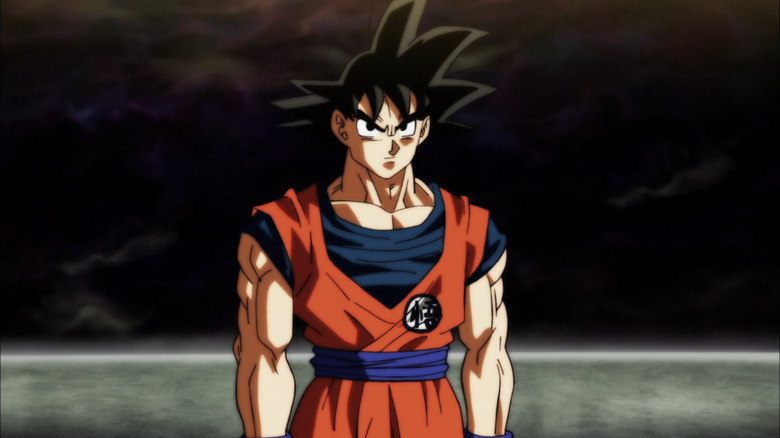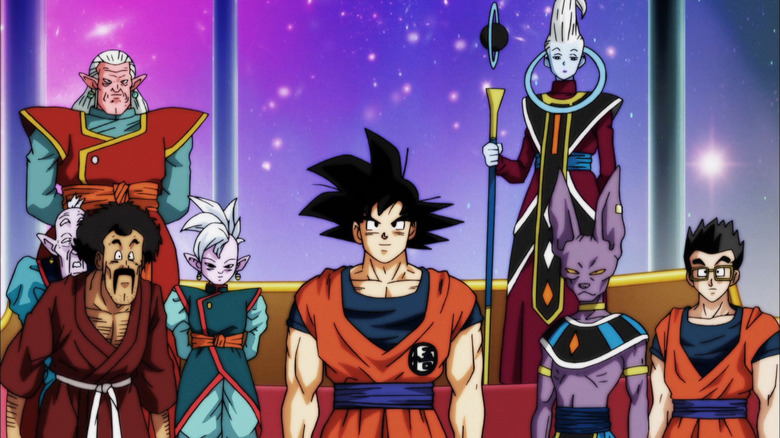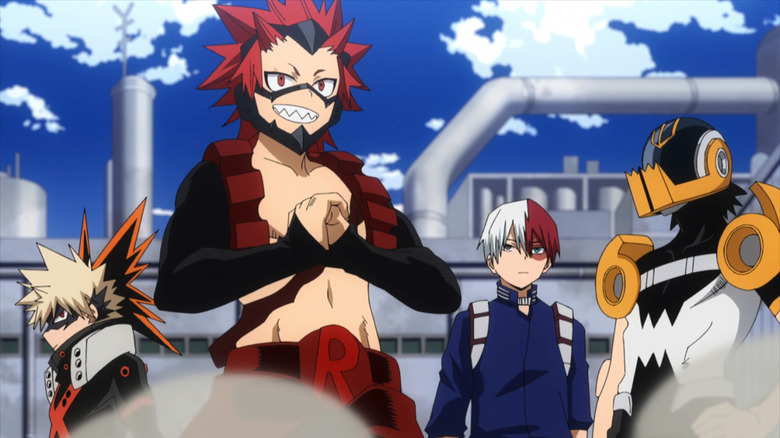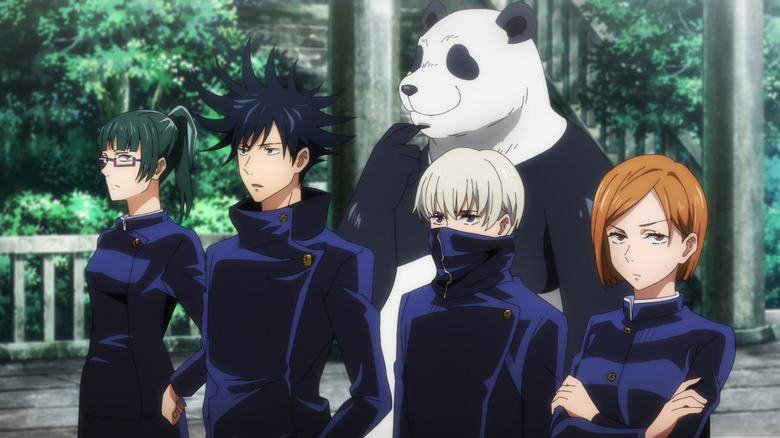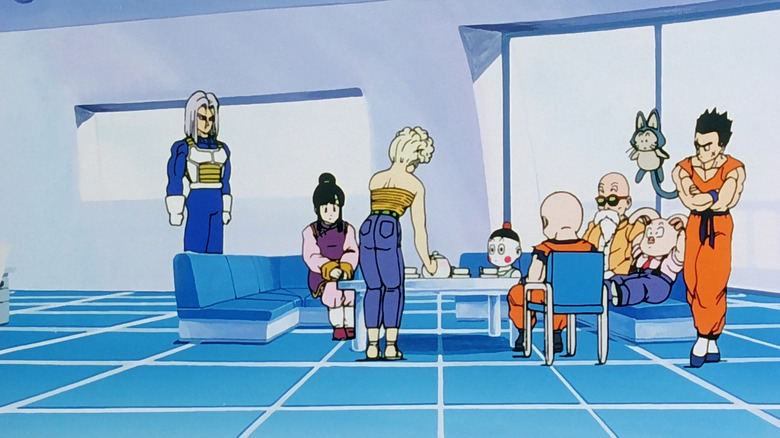Dragon Ball's Most Popular Story Needs To Die
The "Dragon Ball" franchise is not exactly known for the brevity of its storytelling. In a series where a single move like Goku's Spirit Bomb being charged up can take several episodes — and where you'll find superfluous side stories like Piccolo (Takeshi Aono/Christopher Sabat) getting his driver's license – it's fair to say that pacing in the anime adaptation of Akira Toriyama's long-running manga hasn't always pleased fans.
Still, the story arc in "Dragon Ball" that gets repeated the most is actually one that many fans have come to love ... though it's not exactly clear why.
Yes, we're talking about fighting tournaments. They show up time and time again throughout the three canon anime series of the franchise, and the truth is, they bring the ongoing story to a dead halt pretty much every time. Suddenly, the show is no longer about defeating cosmic threats like Frieza (Ryusei Nakao/Linda Young) or Majin Buu (Kozo Shioya/Scott McNeil) but instead, becomes a set of matches that can go on for as long as 35 episodes, with the build-up to the fights ballooning a single saga to an eye-watering 55 episodes. In fact, by the time Cell (Norio Wakamoto/Dameon Clarke) came along with his Cell Games, tournaments were even becoming a part of defeating the show's greatest villains, and they've only grown to bog the "Dragon Ball" franchise down further since.
This is why tournament arcs in anime, and especially this particular franchise, need to be wiped out faster than Yamcha (Toru Furuya/Sabat) in a high-stakes battle.
Dragon Ball tournaments are one of the biggest time-wasters in anime
While we've already pointed out that the endless tournament arcs of "Dragon Ball" have been going on since the original series, it was in the sequel series, "Dragon Ball Z," where they started to become especially egregious. After the thrilling end to the Cell Saga and Gohan's (Masaka Nozawa/Stephanie Nadolny) incredible victory, the show was finally poised to move past Goku's (Nozawa/Sean Schemmel) reign and enter the place where the story should, by all rights, be handed off to Gohan.
However, instead of getting to that monumental moment at last, Season 7 pivots to a plotline where the stakes couldn't be lower: King Kai (Joji Yanami/Schemmel) proposes that the four quadrants of the galaxy have a tournament to decide who the strongest warrior truly is, and with Goku dead from the start of the arc (and still participating in bouts anyway), the fights become increasingly less meaningful throughout.
Though the season does eventually end with the teasing of the final epic threat in "Dragon Ball Z," that does little to assuage the pointless nature of the arc. It also showcases one of the biggest flaws in the franchise as a whole, which is that every time a character grows to be "the strongest," someone else will either pull more power out of nowhere, come back from the dead, or appear from the ether to pose a new and deadly threat.
The popularity of Dragon Ball's tournaments has spread across the medium
As repetitive as the storytelling has grown since the two back-to-back tournaments of Season 6 and Season 7 of "Dragon Ball Z," it's actually the after-effects of the franchise's popularity and its penchant for regular tournaments that have done the most damage to storytelling at the heart of anime and manga in the popular shonen and seinen genres.
Suddenly, every anime from "Pokemon" to "My Hero Academia" had to drum up a new tournament arc every season or two. While the latter series used these tournaments to develop the characters more fluidly and build out the friendships or rivalries between the heroes, it brought a dead halt to the ongoing threats posed by sinister villains like Tomura Shigaraki (Koko Uchiyama/Eric Vale) and All For One (Akio Otsuka/John Swasey).
Meanwhile, other popular anime have been using the expectations behind these kinds of arcs to take viewers for a ride by either mocking the trope or using it as a setup for a surprising plot twist. While tournaments will probably never go away in the medium, this could be the path forward to help at least keep them a bit fresher.
Non-Dragon Ball anime shows at least know how to give the formula a spin
Though we've been pretty hard on tournaments throughout the article, that's not to suggest that nothing interesting can be done with them in anime and manga. Notably, "Jujutsu Kaisen" set up a typical school vs. school tournament in the back half of its first season, only for the central villains of the series to use it as an opportunity to attack both the Tokyo and Kyoto branches of Jujutsu High in one fell swoop.
Not only was this a welcome surprise that shook up the tournament formula in terms of what fans can expect in a show like "Jujutsu Kaisen," but it also forced characters who had been rivals or opponents up until this point to put aside their differences and band together against a greater external threat.
The "Jujutsu Kaisen" tournament was made even more intriguing by the fact that the entire competition is actually a conspiracy for the Kyoto branch to murder Yuji Itadori (Junya Enoki/Adam McArthur) and make it look like an accident. Examples like this show that there are ways to use tournaments as a springboard to set up much more surprising and interesting twists. Meanwhile, "One-Punch Man" offers another fun way that tournament arcs can be told. By lampooning their tropes from the beginning and having the titular hero, Saitama, lose in the most embarrassing manner possible, the series serves up the laughs and mocks the formula of tournament arcs in the process.
We really don't need more tournaments in Dragon Ball
This, of course, brings up back to the "Dragon Ball" franchise. Though the winners of some of the series' tournaments have indeed been surprising, it's clear that, especially in the anime adaptation, these competitions are largely used to spin the wheels of the story while setting up the next proper arc. This is why it's so common for the anime to showcase battles that are completely skipped over in the manga.
Still, what makes this kind of storytelling especially egregious in this day and age is that there are more things to watch on television than ever. Services like Amazon Prime, Netflix, Crunchyroll, Toonami, and HiDive all offer their own unique stables of anime content, and there are constantly new shows and movies coming out to catch up on. This is without even considering all of the live-action shows that most people watch and the never-ending backlog of things that we hope to finally catch up on one day.
Ultimately, this is the biggest reason why "Dragon Ball" and other anime should start to move past tournament arcs, or at the very least, approach them in a different way. In a world where many fans skip out on long-running anime like "One Piece" and "Fairy Tale" simply due to their overwhelming length, society has moved past the point where we need filler arcs and filler episodes. It's time "Dragon Ball" did the same.
